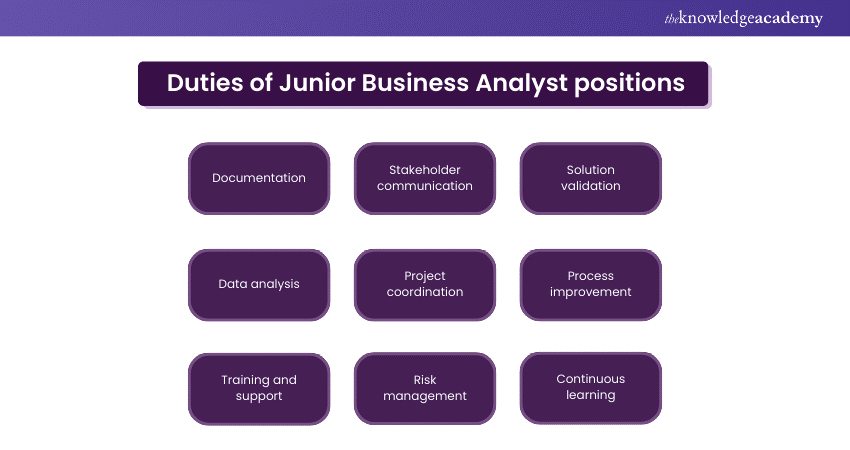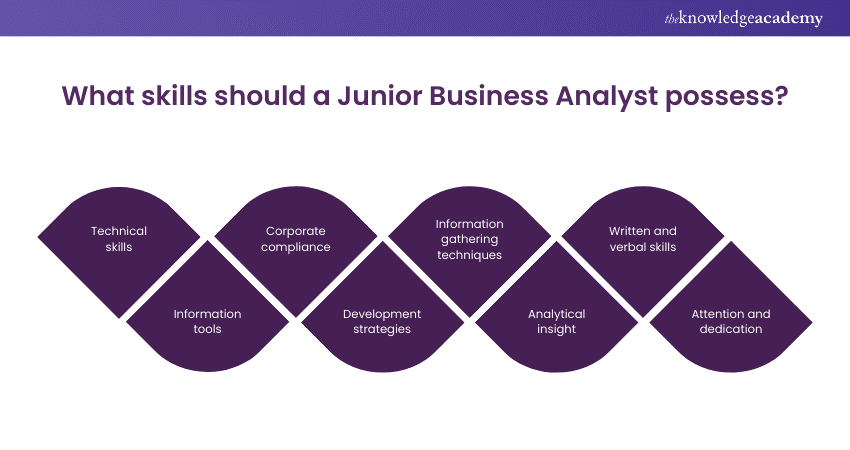We may not have the course you’re looking for. If you enquire or give us a call on +34 932716793 and speak to our training experts, we may still be able to help with your training requirements.
Training Outcomes Within Your Budget!
We ensure quality, budget-alignment, and timely delivery by our expert instructors.

Business Analysts have become indispensable for companies aiming to maintain a competitive edge and nimbleness. As organisations navigate the shifting landscapes of industry demands, Junior Business Analysts play a pivotal role in facilitating this evolution. They act as the vital link connecting business stakeholders with technical units, interpreting and converting business requirements into practical insights and strategies.
So, if you are a budding Business Analysis professional, this blog can provide invaluable insights into the world of Junior Business Analysts. You can read this blog to navigate through the intricacies of this dynamic role. It will also help you uncover the core competencies and responsibilities that define success in this field.
Table of Contents
1) Who is a Junior Business Analyst?
2) Junior Business Analyst roles and responsibilities
3) Junior Business Analyst skills
4) Junior Business Analyst job description
5) How to become a Junior Business Analyst?
6) Junior Business Analyst career opportunities
7) Conclusion
Who is a Junior Business Analyst?
Junior Business Analysts play a crucial role in the operational sectors of an organisation, including sales, marketing, and customer service. Their main task is to collect and scrutinise market and industry data. They collect requirements, record procedures, and assist in the implementation of solutions in close collaboration with senior Analysts and stakeholders.
A Junior Business Analyst is a multidimensional professional who plays a fundamental role in Project Management and Business Analysis. These Analysts assist teamwork by participating in many Project Lifecycle activities, guaranteeing alignment with organisational goals, and producing positive results.
Junior Business Analysts require a diverse skill set to excel in their roles. These skills span technical expertise, proficiency in information tools, understanding of corporate compliance, development strategies, effective information-gathering techniques, analytical insight, strong communication skills, attention to detail, and the ability to learn and adapt quickly.
Junior Business Analyst roles and responsibilities
Junior Business Analysts are assigned numerous essential duties within an organisation. Given below are a few of those important roles and responsibilities:

a) Documentation: Junior Business Analysts are in charge of recording project artefacts, requirements, and business processes. They produce thorough documentation to direct project implementation, including use cases, process flows, Functional Requirement Documents (FRDs), and Business Requirement Documents (BRDs).
b) Stakeholder communication: They facilitate fruitful communication between stakeholders, including business users, Subject Matter Experts, Developers, and Testers. By serving as liaisons, they make sure that the expectations of the stakeholders are recognised and taken into account.
c) Solution validation: Junior Business Analysts participate in solution validation activities, including testing, User Acceptance Testing (UAT), and validation of deliverables against business requirements. They collaborate with stakeholders to ensure that solutions meet quality standards and deliver desired outcomes.
d) Data analysis: Junior Business Analysts support the analysis of data to find insights, patterns, and trends that guide business decisions. For data analysis and stakeholder presentation, they employ tools including Microsoft Excel, SQL, and data visualisation software.
Transform how businesses operate! Apply today to become a Business Systems Analyst and drive efficiency and innovation.
e) Project coordination: In order to validate solutions, Junior Business Analysts assist in User Acceptance Testing (UAT) and verifying deliverables against business requirements. To make sure that solutions fulfil quality requirements and produce the intended results, they work in conjunction with stakeholders.
f) Process improvement: By examining current workflows and locating inefficiencies, Junior Business Analysts find areas for process improvement. They work along with stakeholders to suggest practice ideas that maximise business workflows and promote operational excellence.
g) Training and support: These professionals instruct and assist end users with new tools, procedures, and systems. In addition to leading training sessions and creating training materials, they oversee the process of guaranteeing user acceptance and competency.
h) Risk management: Junior Business Analysts assist in identifying and mitigating project risks by conducting risk assessments, enhancing risk mitigation strategies, and monitoring risk throughout the Project Lifecycle. They collaborate with project teams to proactively address potential issues and minimise project impacts.
i) Continuous learning: Junior Business Analysts engage in continuous learning to learn about industry trends, best practices, and emerging technologies. They seek opportunities to boost their skills and knowledge through training, certifications, and networking.
Become a vital asset to any organisation with our Business Analyst Fundamentals Training – join now!
Junior Business Analyst skills
Junior Business Analysts require certain skills to thrive at the workplace. Some of them are discussed below:

1) Technical skills
Junior Business Analysts should possess proficiency in using software and tools relevant to Business Analysis. This includes familiarity with databases, data modelling tools, and Business Intelligence software to effectively analyse and interpret data.
2) Information tools
Mastery of information tools such as Microsoft Excel, Visio, and PowerPoint is essential for Junior Business Analysts. These tools are used for data analysis, process mapping, and creating presentations to communicate findings and recommendations.
3) Corporate compliance
Junior Business Analysts need to understand industry regulations and compliance standards relevant to their organisation. This knowledge ensures that projects and initiatives adhere to legal and regulatory requirements, mitigating risk and ensuring ethical business practices.
4) Development strategies
Knowledge of methodologies such as Agile or Waterfall is crucial for Junior Business Analysts. Understanding these strategies enables them to effectively plan, execute, and monitor projects, ensuring timely delivery and alignment with organisational goals.
Enhance your career with our Business Analyst Qualification. Get certified now and unlock new opportunities!
5) Information gathering techniques
Junior Business Analysts should possess strong information-gathering skills, including the ability to conduct interviews, surveys, and workshops to gather requirements from stakeholders. Effective information gathering ensures that project objectives are defined and understood by all parties involved.
6) Analytical insight
Junior Business Analysts must be able to analyse data and derive actionable insights. This involves interpreting complex datasets, identifying trends and patterns, and making informed recommendations to support decision-making and drive business outcomes.
7) Written and verbal skills
Strong communication skills are essential for Junior Business Analysts to convey information effectively to stakeholders and team members. This comprises writing clear and concise documentation, presenting findings and recommendations, and facilitating productive discussions.
8) Attention and dedication
Junior Business Analysts should demonstrate attention to detail and deliver quality work. This involves thorough documentation, rigorous testing, and proactive problem-solving to ensure project success.
9) Analysis interaction
Junior Business Analysts need to collaborate effectively with stakeholders and team members throughout the Project Lifecycle. This includes actively participating in meetings, soliciting feedback, and fostering a collaborative environment to fulfill project objectives.
10) Basics learning
Junior Business Analysts should be willing to adapt to new technologies and methodologies. This lets them stay updated with industry trends and contribute toward continuous improvement within the organisation.
Sharpen your analytical skills with our Introduction to Business Analytics Training – join us now!
Junior Business Analyst job description
A Junior Business Analyst typically has a range of responsibilities that revolve around supporting the analysis and improvement of business processes. Here’s a general overview of a Junior Business Analyst job description:
|
Position: Junior Business Analyst Summary: We’re on the lookout for an ambitious Junior Business Analyst with a keen eye for detail to enhance our dynamic team. This role involves a close partnership with our senior analysts and key stakeholders to dissect and refine business processes, pinpoint opportunities for enhancement, and play a pivotal role in devising and deploying strategies that bolster business prosperity and operational efficiency. Key Responsibilities: Data Analysis: a) Harvest, scrutinise and decode data from various sources to spotlight trends, patterns, and actionable insights that align with our business goals. b) Employ statistical methodologies to distill pertinent information and articulate these discoveries to our stakeholders. Requirements Elicitation: a) Engage with stakeholders to extract and chronicle business requisites for upcoming initiatives or improvements to current systems. b) Convert business imperatives into lucid user narratives, scenarios, and detailed functional specifications. Process Optimisation: a) Assess existing business procedures and workflows to unearth inefficiencies and potential enhancements. b) Recommend and actualise strategies to refine operations, amplify productivity, and curtail expenses. Documentation: a) Develop and sustain a repository of critical documents, including business requirements, procedural mappings, and instructional guides. b) Guarantee that all documentation remains current and is readily available to pertinent parties. Project Assistance: a) Provide support in the orchestration, scheduling, and management of project activities. b) Aid senior analysts in the fruition of projects through diligent research, thorough analysis, and consistent progress updates. Communication: a) Foster effective dialogue with multidisciplinary teams to secure a unified vision for project objectives and benchmarks. b) Convey insights, suggestions, and project statuses to stakeholders in a straightforward and impactful manner. Qualifications: a) A Bachelor’s degree in Business Administration, Finance, Information Systems, or a related discipline. b) Adept analytical abilities with a flair for gathering, structuring, examining, and broadcasting substantial data with precision and detail. c) Proficiency in Microsoft Excel, SQL, and other pertinent data analysis instruments. d) Stellar communication prowess, both written and oral. e) The capacity to operate autonomously and in concert with others in a brisk environment. f) A zest for learning and adapting to novel technologies and methods. g) Previous experience in business analysis or a similar role is advantageous. Additional Details: a) This is a permanent role situated at our [Location] headquarters. b) Intermittent travel may be necessary for client engagements or project-centric tasks. c) We provide a competitive salary and benefits scheme, coupled with prospects for professional advancement and career progression. |
How to become a Junior Business Analyst?
To embark on a career as a Junior Business Analyst, individuals typically pursue relevant educational qualifications. They may also seek certifications in Business Analysis to enhance their credentials. Moreover, receiving practical experience through internships or entry-level positions is advantageous in numerous ways.
Streamline Your Processes – Connect with a Business Process Analyst Today!
Junior Business Analyst career opportunities
The role of a Junior Business Analyst serves as a gateway to various career paths within the field of Business Analysis and beyond. With experience and expertise, such Analysts can advance to roles like Senior Business Analyst and Project Manager. They can also pursue specialised domains like data analysis, process improvement, or product management.
Bridge the gap between IT and business. Join us as an IT Business Analyst and shape the future of tech-driven solutions!
Conclusion
Junior Business Analysts play a pivotal role in the prosperity of their organisations by providing valuable insights, aiding in decision-making processes, and bolstering strategic efforts. With their extensive range of skills, dedication to continuous education, and enthusiasm for resolving challenges, these analysts are equipped to deliver substantial impact within the business landscape.
Elevate your career to new heights with our Certified Business Analyst Professional (CBA-PRO) Course – join us now!
Frequently Asked Questions

Understanding what, why, who, when, and how of a business opportunity or challenge centres around the five fundamental questions of Business Analysis. They support the definition of goals, the identification of stakeholders, the scope, and the setting of deadlines.

Stakeholder analysis, enterprise analysis, scope definition, requirements analysis, solution assessment and business case formulation are the six Business Analysis pillars. These pillars, altogether, ensure that certain initiatives satisfy stakeholder needs and add value to the company. By doing so, they serve as the cornerstone of good Business Analysis.

The Knowledge Academy takes global learning to new heights, offering over 30,000 online courses across 490+ locations in 220 countries. This expansive reach ensures accessibility and convenience for learners worldwide.
Alongside our diverse Online Course Catalogue, encompassing 17 major categories, we go the extra mile by providing a plethora of free educational Online Resources like News updates, Blogs, videos, webinars, and interview questions. Tailoring learning experiences further, professionals can maximise value with customisable Course Bundles of TKA.

The Knowledge Academy’s Knowledge Pass, a prepaid voucher, adds another layer of flexibility, allowing course bookings over a 12-month period. Join us on a journey where education knows no bounds.

The Knowledge Academy offers various Business Analyst Courses, including the Statistics Course, Business Analyst Fundamentals Training, and Business Process Mapping Training. These courses cater to different skill levels, providing comprehensive insights into the Business Intelligence Analyst Job Description.
Our Business Analysis Blogs cover a range of topics related to Junior Business Analysts, offering valuable resources, best practices, and industry insights. Whether you are a beginner or looking to advance your Business Analysis skills, The Knowledge Academy's diverse courses and informative blogs have got you covered.
Upcoming Business Analysis Resources Batches & Dates
Date
 Business Analyst Fundamentals Training
Business Analyst Fundamentals Training
Fri 21st Feb 2025
Fri 25th Apr 2025
Fri 20th Jun 2025
Fri 22nd Aug 2025
Fri 17th Oct 2025
Fri 19th Dec 2025







 Top Rated Course
Top Rated Course



 If you wish to make any changes to your course, please
If you wish to make any changes to your course, please


